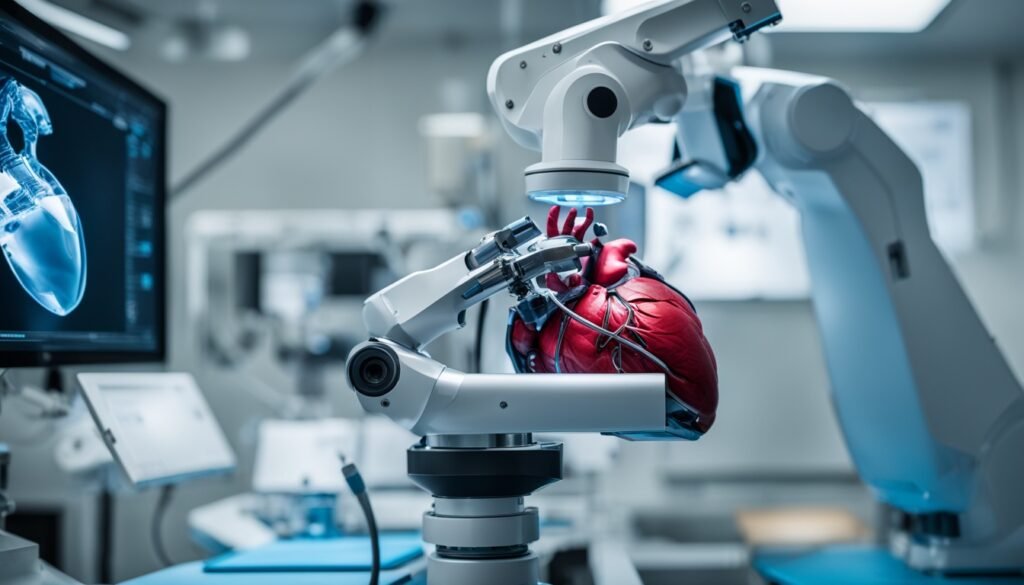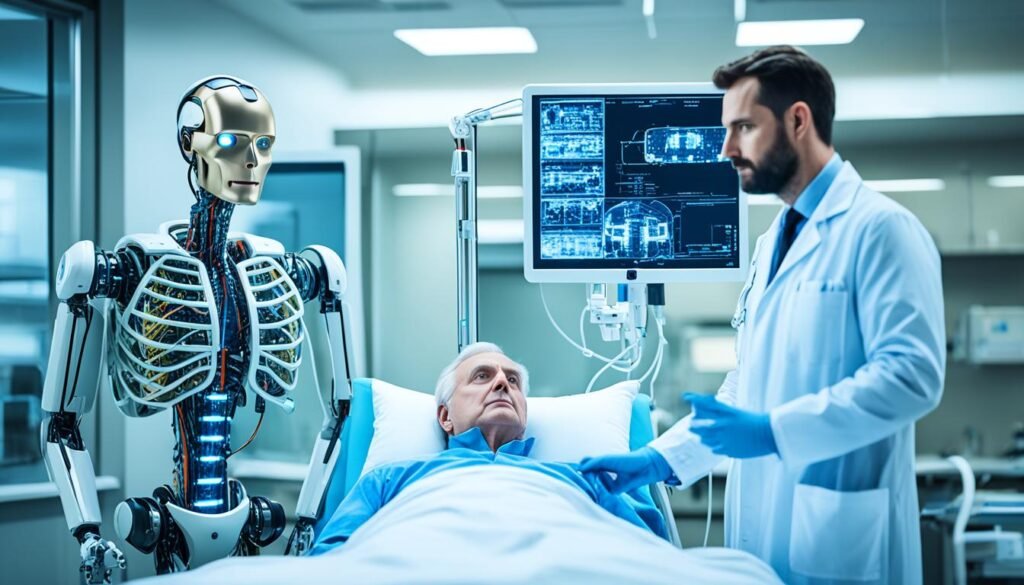Did you know AI can predict acute kidney injury up to two days early? This is a big step forward in healthcare. But, using AI in healthcare comes with its own set of challenges. This article will look into the main AI issues in healthcare. We’ll cover public concerns, doubts about better patient care, and the good and bad sides of AI in medicine.
We’ll also talk about ethical issues and what the future holds for AI in healthcare.
Key Takeaways
- AI can automate tasks in medical care, saving time and possibly improving patient care quality.
- There are privacy worries with collecting big datasets for AI training, which could break patient privacy.
- Healthcare AI might carry bias and inequality risks, as it could reflect biases in the training data and worsen existing inequalities.
- It’s hard to replicate the emotional parts of medical care, like empathy and compassion, with AI-driven robots.
- Using AI in healthcare responsibly means tackling ethical and data privacy issues.
Introduction to AI in Healthcare
Artificial Intelligence (AI) is changing many industries, including healthcare. It’s still new in healthcare, but it’s already making a big difference. AI is helping improve patient care, research, and even administrative tasks. Let’s look at how AI is being used now and what it could do in the future.
Current Applications of AI in Healthcare
AI is being used in healthcare, but not as much as it will be. Here are some ways AI is helping in healthcare today:
- Diagnosing patients by analyzing medical images like X-rays and MRIs.
- Using Automatic Speech Recognition (ASR) to write out medical documents.
- Helping find new medicines by looking through huge amounts of data.
- Making tasks like billing and scheduling easier.
AI Technologies Used in Healthcare
The healthcare industry uses many AI technologies to improve care and innovate. Some important AI technologies in healthcare are:
- Machine Learning
- Neural Networks
- Deep Learning
- Natural Language Processing
- Rule-Based Expert Systems
These technologies help doctors make better diagnoses and work more efficiently. They also speed up finding new medicines. This leads to better patient care and lower costs.
“The main importance of AI in healthcare is to make healthcare systems smarter, faster, and more efficient while providing quality care and reducing costs.”
Public Concerns and Discomfort with AI in Healthcare
Even though AI is becoming more common in healthcare, many people are still worried. A recent survey by the Pew Research Center found that 60% of Americans don’t like the idea of their doctors using AI for things like finding diseases and suggesting treatments.
People worry that AI might not make healthcare better. Only 38% think AI will lead to better health outcomes. They are also worried that healthcare providers are moving too fast with AI, without understanding the risks well.
| Concerns and Attitudes Towards AI in Healthcare | Percentage of Respondents |
|---|---|
| Uncomfortable with healthcare providers relying on AI for diagnosis and treatment | 60% |
| Believe AI usage in healthcare would result in improved health outcomes | 38% |
| More concerned about providers implementing AI too quickly without understanding risks | 75% |
| Believe AI could enhance quality of care for patients like themselves | 31% |
People are also worried about how AI will change doctor-patient relationships, data safety, and the chance of more mistakes. Only a third of Americans think AI can lessen racial and ethnic bias in healthcare. The industry has a big task ahead to win over the public’s trust in AI.

Skepticism About Improved Patient Outcomes
Many people are unsure if artificial intelligence (AI) in healthcare will make things better. A recent Pew Research Center survey found that only 38% of Americans think AI will improve healthcare. 33% believe it will get worse, and 27% think it won’t change much.
Demographic Differences in Optimism About AI
Demographics affect how people view AI in healthcare. Men, younger adults, and those with higher education are more hopeful about AI’s benefits. On the other hand, women, older adults, and those with lower education are less optimistic. This shows that public skepticism of AI improving healthcare varies by age, gender, and education differences in AI perception.
“More than 60% of patients lack trust in AI in healthcare according to recent reports.”
These results highlight the need for better trust in AI healthcare solutions. Healthcare providers, policymakers, and tech companies must work together. They need to communicate clearly, test thoroughly, and use AI ethically. Also, teaching healthcare workers and the public about AI is crucial.
Potential Benefits and Drawbacks of AI in Healthcare
AI is changing healthcare in big ways, bringing both good and bad changes. It’s important for healthcare workers and patients to know what AI can do and what it can’t. This knowledge helps us make the best use of AI in healthcare.
Reducing Medical Errors and Bias
AI can greatly reduce mistakes in healthcare and help fix the problem of bias. It can make diagnoses more accurate and find conditions sooner. It can also make tasks like billing and scheduling easier, saving time and money.
Challenges for Patient-Provider Relationships and Data Security
But, AI also brings challenges. Some think it could make the bond between patients and doctors weaker. Others worry about the safety of patient data, fearing AI could lead to more data breaches.
To overcome these issues, healthcare workers and leaders must work together. They should make sure AI is used in a way that protects patient privacy and keeps the human touch in healthcare.
| Potential Benefits of AI in Healthcare | Drawbacks of AI in the Medical Field |
|---|---|
|
|
The healthcare world is always changing, and we need to find the right balance with AI. By facing these challenges and using AI wisely, healthcare providers can make the most of this technology. This way, they can keep the personal touch that makes healthcare special.

Addressing Racial and Ethnic Bias in Healthcare
Racial and ethnic bias in healthcare is a big problem, with 70% seeing it as a major or minor issue. Yet, many hope that using more AI in healthcare can lessen this bias. In fact, 51% believe AI could make things better.
Perspectives on AI’s Role in Reducing Bias
White, Hispanic, and English-speaking Asian adults are more hopeful about AI’s role in fighting bias. However, Black adults are less convinced, with only 40% thinking AI can help.
A panel of nine diverse experts was brought together by the AHRQ and NIMHD. They came up with a plan to tackle algorithmic bias. Their ideas were shared in JAMA Network Open on December 15.
Biased AI can make it seem like minorities need to be sicker than whites to get the same care. Experts have found these biases in areas like heart surgery and kidney transplants.
The panel laid out five steps to fix biased algorithms: identifying problems, choosing data, making the algorithm, deploying it, and checking how it’s doing. They also shared five ways to stop bias, like promoting fairness and being open about how AI works.
Lucila Ohno-Machado, MD, PhD, MBA, stressed the need for healthcare workers to fight biases that hurt underrepresented patients. Plans are being made for workshops and training on ethical AI use to shape the future of the tech.
Efforts are underway to fight bias in algorithms and use AI for fairness. Many clinical tools are now ignoring race to avoid unfair results. For example, eGFR and Vaginal Birth after Cesarean calculators no longer use race.
Studies show AI can help reduce racial disparities in healthcare and improve how doctors make decisions. AI has been successful in fighting racial inequalities and lowering pain in underserved areas.
To lessen bias, experts suggest using more diverse data and focusing on fairness and justice in AI development. As AI becomes more common in healthcare, it’s key to tackle racial and ethnic bias and use the tech for fairness.
ai problems in healthcare
AI brings many benefits to healthcare, but it also has big challenges. Ethical worries about data privacy and security are key concerns. The impact on healthcare jobs is another big issue.
Ethical Concerns and Data Privacy Issues
AI in healthcare raises big ethical questions about patient data use. With more digital info and generative AI, keeping patient records safe is a big worry. In fact, 37% of the public believe that AI would make the security of patient data worse. Keeping patient info safe and building trust in healthcare is vital as AI grows.
Job Displacement and Human-AI Collaboration Challenges
AI in healthcare also worries people about losing jobs and working with AI systems. In 2018, 71% of Americans surveyed believed that AI would eliminate more healthcare jobs than it creates. The effect on jobs is still unclear, but some jobs like medical coding might be taken over by AI. Working well with AI tools also needs careful thought on what each can do best.
As healthcare uses more AI, tackling these ethical and job issues is key. We need to make sure AI’s benefits outweigh its risks and problems.

Future Directions for AI in Healthcare
The future of AI in healthcare is bright, with experts seeing more use in clinical practice soon. AI will greatly improve diagnostics and treatment, and help prevent diseases and find new drugs.
Enhanced Diagnostics and Personalized Treatment
AI is changing how we look at medical images. It can spot conditions like cancer and heart diseases in X-rays and MRIs. This is because AI uses big data and learns from it to find patterns we might miss.
AI also uses patient data to predict diseases and make treatment plans just for you. This means doctors can give care that fits your specific needs.
Disease Prevention and Drug Development
AI is changing how we prevent diseases and find new drugs. It looks at huge amounts of data to predict outbreaks and help stop them. This can save lives by acting early.
In drug development, AI speeds up finding new medicines. It looks through lots of data to pick out promising drugs faster. This could make getting new medicines to patients much quicker.
“AI will play a pivotal role in transforming healthcare, from enhancing diagnostic accuracy to personalizing treatment plans and accelerating drug discovery. The future is bright for this powerful technology.”
As AI becomes more common in healthcare, we can expect better diagnoses, treatments made just for us, and faster drug development. This could lead to better health outcomes and a healthier future.
Balancing Benefits and Risks of AI Adoption
The healthcare industry is embracing artificial intelligence (AI) with caution. AI could change healthcare by making diagnoses better, treatments more tailored, and preventing diseases. But, there are big security and privacy concerns that need attention.
Security and Privacy Risks
Healthcare is a prime target for hackers because it handles a lot of patient data. AI systems can also face special threats, like membership inference, reconstruction, and property inference attacks. These threats can break the privacy and security of the data used to train AI.
Unique AI Vulnerabilities and Attacks
- Membership inference attacks can show if an AI model was trained with a specific person’s data, risking their privacy.
- Reconstruction attacks can rebuild parts or all of the training data, threatening patient privacy.
- Property inference attacks can find out private details about the training data, like health info or demographics, without permission.
We need to stay alert and act fast to reduce these risks and make AI in healthcare safe. It’s key to balance the good and bad sides of using AI in healthcare. This balance is vital for gaining trust and providing top-quality, fair healthcare to everyone.

“Transparency, accountability, and trust are crucial for successful integration of artificial intelligence into patient care.”
Responsible Implementation of AI in Healthcare
AI is changing healthcare fast. It’s key to use it right. This means being open about how it works and the data it uses. We must also tackle bias to make sure everyone gets fair care. Plus, we need to watch out for AI threats like data poisoning and model extraction.
Transparency and Algorithmic Bias Mitigation
Being open is vital for AI in healthcare. Patients and doctors need to know how AI makes decisions and what data it uses. This builds trust in AI. We also need to work hard to stop bias in AI. This ensures everyone gets the same care.
Vigilance Against AI-Specific Attacks
AI in healthcare is at risk from special threats. Doctors must be quick to spot and stop attacks like data poisoning and model extraction. These threats can mess with AI’s accuracy and patient data. By keeping up with AI security news and using strong cybersecurity, we can protect our patients and keep trust in AI.
For AI to help healthcare fully, we must use it responsibly. This means being open, fighting bias, and watching out for threats. This way, AI can really help patients and doctors, without causing problems.
| Responsible AI Principle | Key Considerations |
|---|---|
| Transparency |
|
| Algorithmic Bias Mitigation |
|
| AI Security |
|
“Transparency and trust are essential for AI adoption in healthcare, with a focus on respecting individuals’ privacy.”
Integrating AI into Healthcare Career Programs
AI is becoming key in healthcare. It’s vital to add AI content and skills to healthcare programs. This makes sure future healthcare workers can work well with AI.
Adding AI courses, practical training, and case studies to education helps. It prepares the next medical generation for AI in healthcare. This way, they’ll understand how to use AI in their work.
Healthcare programs need to keep up with AI’s fast growth. AI changes how we look at medical images, find diseases, and make decisions. By teaching future healthcare workers about AI, we help them move into an AI-augmented future smoothly.
| Key AI Applications in Healthcare | Potential Benefits |
|---|---|
|
|
Adding AI to healthcare education helps the next medical generation use AI’s power. This way, they’ll be ready for AI in healthcare. It will lead to better patient care and outcomes.
“The integration of AI into healthcare education is crucial for preparing the future workforce to effectively leverage these technologies and drive positive change in the industry.”
Conclusion
AI in healthcare brings both good and bad sides. It can make diagnoses more accurate, help with paperwork, and make patients’ outcomes better. But, we need to think about how it changes the doctor-patient relationship, keeps data safe, and affects jobs.
Healthcare workers and leaders must weigh the pros and cons of using AI. They should be open and think about what’s right and wrong. Also, they need to get the next generation ready to work with AI.
This way, healthcare can use AI to give patients better care that’s tailored to them. AI could change how we diagnose, treat, and prevent diseases. This could lead to better health outcomes and a more efficient healthcare system.
As AI in healthcare grows, everyone involved must keep up with the changes. This includes doctors, lawmakers, and the public. By working together, we can make sure AI makes healthcare better and improves patients’ lives.
FAQ
What are the current applications of AI in healthcare?
AI helps in healthcare by analyzing medical images, writing medical notes, finding new drugs, and making admin tasks easier like billing.
Why are there public concerns and discomfort with the use of AI in healthcare?
Many Americans (60%) don’t like the idea of AI helping with diagnoses and treatment plans. They doubt AI’s ability to improve health outcomes, with only 38% thinking it will lead to better health.
Why are people skeptical about the improved patient outcomes from using AI in healthcare?
Only 38% of Americans think AI will make healthcare better. 33% fear it could make things worse, and 27% don’t see much change. Men, younger people, and those with more education are more hopeful about AI’s benefits.
What are the potential benefits and drawbacks of using AI in healthcare?
AI could cut down on medical mistakes and reduce healthcare bias. But, it might also harm the doctor-patient bond and put patient data at risk. 57% worry AI will worsen the patient-provider relationship, and 37% fear it will compromise patient data security.
How can AI help address the issue of racial and ethnic bias in healthcare?
51% see AI as a solution to healthcare bias. This belief is stronger among Whites, Hispanics, and English-speaking Asians. However, Black adults are less convinced about AI’s bias-solving abilities.
What are the ethical concerns and data privacy issues with the use of AI in healthcare?
People worry about AI’s impact on patient data security, with 37% thinking it will worsen. There are also fears about job losses and the need for humans and AI to work together well.
How can the healthcare industry responsibly implement AI to realize its full potential?
To use AI right, we must be open about how it works and tackle bias. We need strong security and privacy steps to protect against AI threats like data attacks.
How can AI-related content and skills be integrated into healthcare career programs?
Adding AI courses, practical training, and real-life examples to healthcare education will prepare future doctors to work well with AI. This way, they can use AI to improve healthcare.
